#false rape accusations
Text



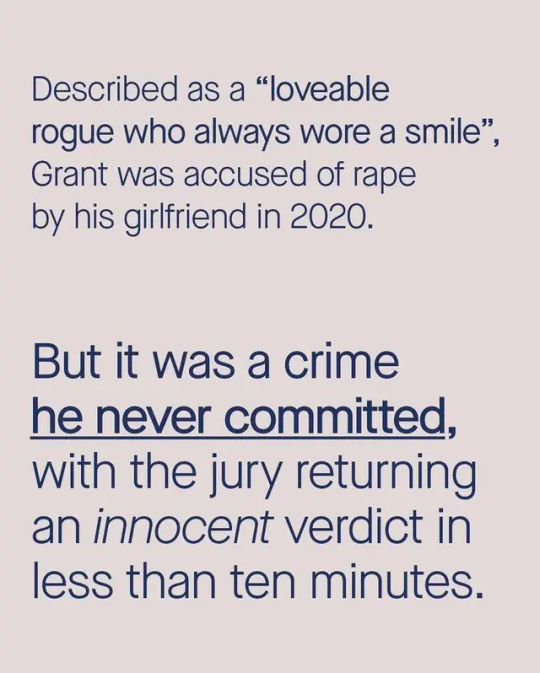



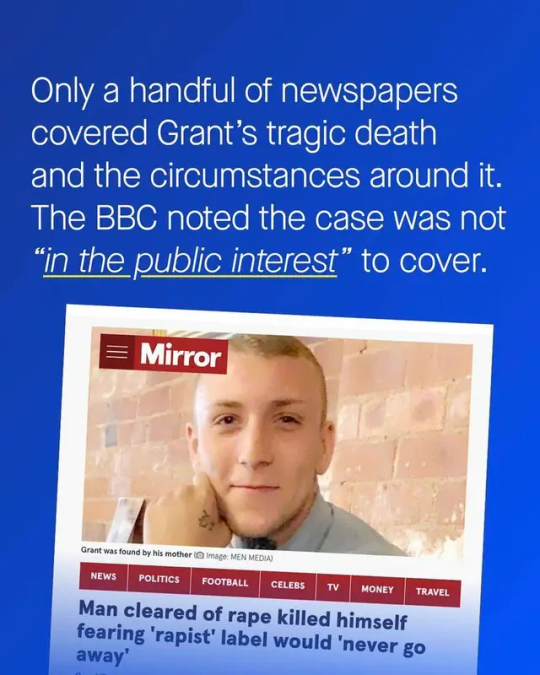


The trial of Depp vs Heard is over, so as we wait to hear the final verdict, could this be a chance to talk about men who are falsely accused of sexual violence – who are *not* Johnny Depp?
Because this isn’t a one time only problem, or isolated matter.
As many others have had their lives, families, relationships, careers and wellbeing completely destroyed by malicious and totally fabricated accusations.
The truth is, we don’t really know how many of these types of accusation are out there, and we don’t know who is telling the truth or who isn’t.
But we can be sure that the problem reaches beyond Johnny Depp, and if now isn’t the opportunity to talk about it and find solutions, then when is?
#justiceforJohnnyDepp #justiceforjohnny
-
Sources:
[1]:
https://en.wikipedia.org/wiki/False_accusation_of_rape#cite_note-KLR-39
FBI:
https://ucr.fbi.gov/crime-in-the-u.s/1996/96sec2.pdf
BBC write up:
https://www.bbc.co.uk/news/world-us-canada-45565684
BBC Doc, "I am not a Rapist":
https://www.bbc.co.uk/iplayer/episodes/p08pldr0/i-am-not-a-rapist
==
False accusations aren't harmless. They ruin lives.
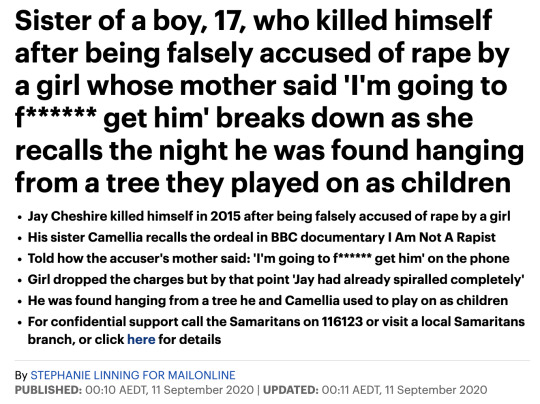

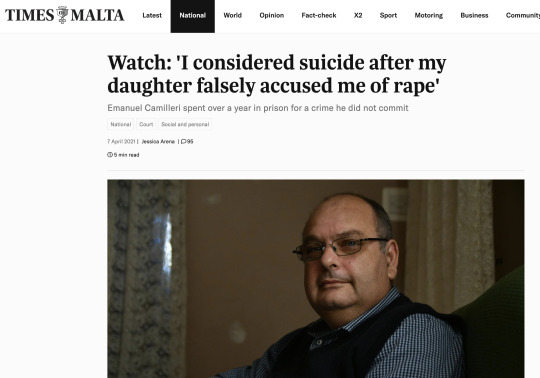
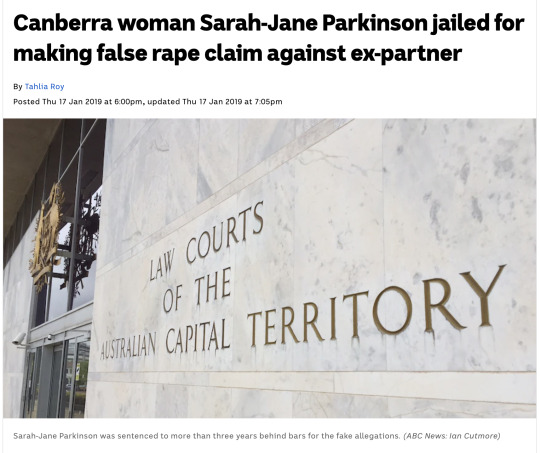


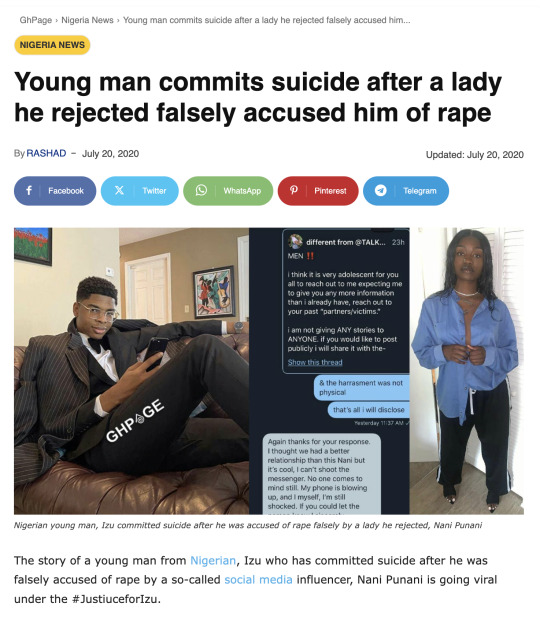


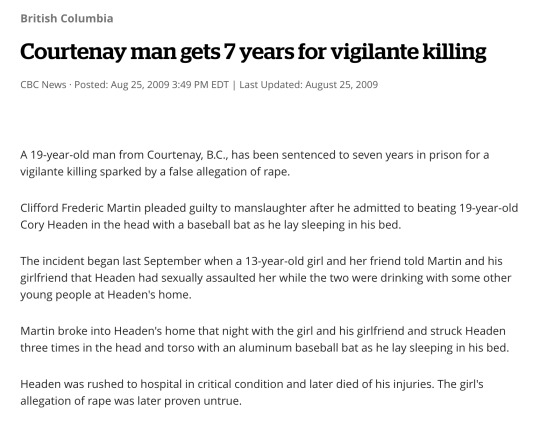

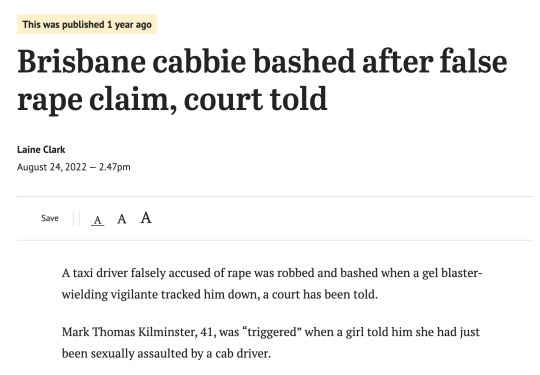







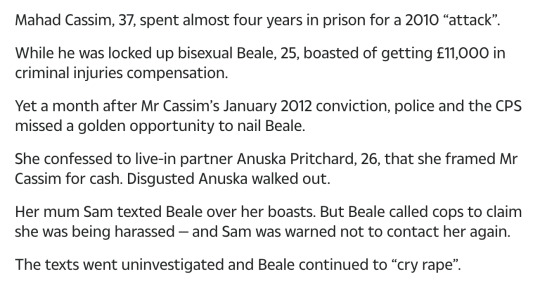
[ The Tumblr image slot limitations prevented more being added. ]
Meanwhile...
"Men who are unjustly accused of rape can sometimes gain from the experience."
-- Catherine Comins, assistant dean of student life at Vassar
Imagine how quickly a male assistant dean would be fired if he said something like, "women who are raped but can't get justice can sometimes gain from the experience."
You can't claim there is "rape culture" in the west when even a false accusation can cost your life.
False accusations need to be tried as attempted homicide, because the accuser is attempting to kill the falsely accused by proxy: murdered in prison from being at the bottom rung of prison hierarchy; tormented into committing suicide; or the target of violent retribution by others. Those who make false accusations know exactly what they're doing.
#The Tin Men#false accusations#false rape accusations#rape accusations#rape culture#Grant Townsend#suicide#male suicide#religion is a mental illness
12 notes
·
View notes
Text

Feminism is about revenge and collateral damage. And it's not just the feminists who believe this, but also all the feminists who remain silent.
The men who suffer the worst from Emily's insanity, of course, will be black men.
But she knows that, of course.
#feminism#tw rape#rape accusations#false rape accusations#innocent men must suffer#misandry#gender revenge#revenge politics#collateral damage#patriarchy#innocent men
3 notes
·
View notes
Text
It might seem surprising, then, that false rape accusations are, today, a predominantly wealthy white male preoccupation. But it isn't surprising—not really. The anxiety about false rape accusations is purportedly about injustice (innocent people being harmed), but actually it is about gender, about innocent men being harmed by malignant women. It is an anxiety, too, about race and class: about the possibility that the law might treat wealthy white men as it routinely treats poor black and brown men. For poor men, and women, of color, the white woman's false rape accusation is just one element in a matrix of vulnerability to state power. But false rape accusations are a unique instance of middle-class and wealthy white men's vulnerability to the injustices routinely perpetrated by the carceral state against poor people of color. Well-off white men instinctively and correctly trust that the legal justice system will take care of them: will not plant drugs on them, will not gun them down and later claim to have seen a weapon, will not harass them for walking in a neighborhood where they "don't belong," will give them a pass for carrying that gram of cocaine or bag of weed. But in the case of rape, well-off white men worry that the growing demand that women be believed will cut against their right to be shielded from the prejudices of the law.
That representation is, of course, false: even in the case of rape, the state is on the side of wealthy white men. But what matters—in the sense of what is ideologically efficacious—is not the reality, but the misrepresentation. In the false rape accusation, wealthy white men misperceive their vulnerability to women and to the state.
-Amia Srinivasan, The Right to Sex: Feminism in the Twenty-First Century
6 notes
·
View notes
Note
what do you think of the proposition of women spreading false rape claims serving jailtime?
in the future that is. when the definition of rape includes men [hopefully]
My understanding of the law is limited and my brain has only just woken up for the day, so I hope you'll forgive this answer.
I'm trying off the top of my head to think of another crime where false accusations happen - insurance fraud doesn't really cut it, because a faceless insurance broker is not a victim in the same way that an individual man falsely accused of rape is. Rape is a very toxic crime to be associated with even spuriously, but it's hard for a victim to falsely accuse someone of murder, perhaps the only crime with which the association is worse.
Thing is, false accusations can go on for any length of time before the story breaks down, but ideally, yes I would want false accusers to serve jail time, and I think it would make the most sense to treat it as seriously as we do perjury. Many false accusers may end up lying in court. Some will not, but I would argue that treating it as seriously as perjury is necessary anyway in a world where the court of public opinion has the first and loudest say on crimes like these.
It's important to point out that "not finding enough evidence to convict/bring to trail" is not the same thing as "proving it was made up." Real victims of rape still need to come forward and the law should make allowances for it. The standard of evidence for proving falsehood must be high.
I know that doesn't make a lot of logical sense, because rape either does or does not happen, but if the burden of proof is on the accuser to prove what is in practice a very difficult-to-prove crime (rape), then failing to do so counts for very little; the burden of proof should ALSO be on the accuser for the crime of Making It Up.
I mean things like the taxi driver, proving with his dashboard camera that the ladies he was transporting said words to the effect of "we'll accuse you of raping us if you don't do what we want". That's a slam dunk, right? People like Alice Sebold are a bit more complicated - we can say confidently she wasn't raped by the one particular guy she accused, but does that mean she wasn't raped at all? It's very hard to say now, and unless we have her on record saying "yeah I made it up, I guess I just hate black people that much, lol", it's very hard to prove her intent.
I recognize that these things are exploitable by abusive people, but that's the thing we always have to try and correct for. No law is without exploitability. Current rape law in many countries is abusable because accusation alone is enough to start treating the accused party as guilty by the court of public opinion, and very hard to defend against if the alleged victim provides a harrowing enough account. Which is something that manipulative people can easily just pretend to do. Also, women are very rarely accused of it. We would like to correct one of those things, at least, by altering the incentives - now there is a potential punishment for just making it up - but you've gotta balance it so that it's not just "Oh, you can't prove your rape accusation 100% with timestamps and eyewitnesses and voice recordings? Off to jail with you!"
It is tough to get that kind of nuance these days though.
3 notes
·
View notes
Text
Since that dumbass Maybeplayingsmash has decided to make shit up about my positions on rape accusations... yet again... I think that this is a good time for me to repeat my actual stance on them. You can then go back to my old posts and see that my position back then is still consistent with what I’m saying now; but not with what Maybeplaying claims that I said.
So here’s the short version:
False rape accusations are rare.
False rape accusations made specifically to ruin someone’s life are even rarer, and often ineffective.
The "ineffective” part is especially true if you’re white and you don’t act like a sleazy predator.
In a public discussion, your judgment about “Is Person X guilty or not?” is up to your own discretion.
Longer version under the cut.
False rape accusations are rare.
There’s a lot of studies about rape accusations, but many of them don’t make a distinction between fake and unfounded. An unfounded accusation is when you accuse someone, but the cops think that there isn’t enough evidence to warrant an investigation; a false accusation is when you knowingly and deliberately accuse someone of a crime that they did not commit. Many of these studies blindly believe cops when they refused to investigate certain cases because “they were obviously false”... despite the fact that the cops refused to investigate, and therefore don’t actually know whether thoe cases are false or not.
(And yes, there IS a pretty big problem of cops refusing to investigate rape cases when instead they should have investigated them. In particular, there’s the “rape kit backlog” - thousands of rape kits that the cops refused to test. When they tried checking 1,600 rape kits in Detroit, they found that many of them contained DNA from 100 confirmed serial rapists. If those kids had been tested, maybe the cops would have identified those rapists sooner.)
Anyway, the study I use is David Lisak’s which states that only 6% of rape accusations are false. However, only a third of rapes are reported, so the real percentage of false rape accusations should be just 2% of rape cases - which is pretty similar to the percentage of criminal cases that are false.
False rape accusations made specifically to ruin someone’s life are even rarer, and often ineffective.
On top of being rare, false rape accusations tend to follow specific patterns.
In some cases, people falsely claim to have been raped in order to cover up something else - for example: someone accidentally gets pregnant, and to justify the pregnancy, they claim to have been raped. The issue with these accusations is that the accuser usually doesn’t accuse a specific person that actually exists; instead, they make up a fictional attacker, keeping the details intentionally vague. Between the vagueness and the lack of evidence (since the rape, you know, didn’t actually happen), it’s extremely unlikely that the rape will be reported to the police; get investigated; and actually result in someone being formally arrested.
Then there’s the cases where the accuser is a mentally ill person who only thought that someone raped them. Usually, when this happens, the accuser either has a history of compulsive lying (which will discredit them and paint them as an unreliable witness); or they were really victims of some horrible abuse, and they interpreted it as rape. In the first case, even if someone accuses you, you’ll be safe because the accuser won’t be believed; and in the second case, you are very unlikely to be accused unless you’re someone who goes around abusing disabled people.
Then there’s the “revenge” cases - the cases where someone actively hates you and deliberately decides to accuse you of raping them, even when you didn’t. The problem with these cases is that the accusation itself tends to be over-dramatic, with plenty of lurid details - because the accuser specifically wants to draw attention to the accusation as much as possible, in order to ruin your reputation. The problem is that these accusations often describe situations that, if they really did happen, they would leave tons of evidence behind; but since the accusation is, well, false, the evidence doesn’t exist. So when people look for evidence and don’t find any, they won’t think “Well, that was to be expected: most rapes don’t leave around much physical evidence". They will think: “Wait, she said that 20 men broke in her home and violent raped her, but there’s no evidence whatsoever, the house is still intact, none of the neighbors noticed anything? Something doesn’t add up.”
So, as you can see, false rape accusations aren’t exactly effective in terms of “Will your reputation be ruined?”. Even if someone deliberately decides to falsely accuse you, they are extremely unlikely to be believed. And society already has a huge bias against rape victims, so the odds are even more stacked in your favor.
The "ineffective” part is especially true if you’re white and you don’t act like a sleazy predator.
The second part is easy to explain. If you take a sleazy guy that doesn’t respect people’s sexual boundaries, and a guy that instead does respect boundaries and doesn’t harass people; and you accuse them both of being rapist, the accusation against the former will be much more likely to be accepted by third parties.
As for the first part, we’ll have to look at wrongful convictions - cases where an innocent person was jailed unjustly. Specifically, we must look at race. Black people are much more likely to be unjustly accused, compared to white people; and if we look at only the people who have been unjustly accused, black people are much more likely to be jailed, compared to white people. So it’s clear that race absolutely plays a part in the false accusations issue - if you’re white, you’re much less likely to be falsely accused, and false accusations have a much lower chance of actually affecting you.
In a public discussion, your judgment about “Is Person X guilty or not?” is up to your own discretion.
In discussions about rape cases, pretty much 100% of the time, there’s at least one guy who yells “Innocent until proven guilty! You must wait until the trial is over!”. They try to shut down discussions about the suspect’s guilt, claiming that it would be unfair to judge someone as “guilty” without a trial.
But, strangely, when it comes to other crimes, this is much less ikely to happen: commenters are fine with allowing people to claim that the suspect is guilty, even if they disagree with the judgment. So what is going on here?
First of all, we must understand the concept that different contexts have different “standards of evidence”. Let’s take penal and civil trials, for example:
Penal trials follow an “innocent until proven guilty beyond reasonable doubt” standard. If there’s a reasonable chance that Person X is innocent, then the jurors must declare Person X to be innocent; if there’s no reasonable chance, then the jurors must declare Person X to be guilty.
Civil trials, instead, follow a “preponderance of evidence” standard. If the evidence in favor of Person X’s innocence is more abundant and compelling than the evidence in favor of their guilt, then the jurors must declare Person X to be innocent; but if the evidence of Person X’s guilt is more abundant - even if there’s still a reasonable doubt that Person X might be innocent - then the jurors must declare Person X to be guilty.
As you can see, to declare someone guilty in a civil trial, you need less evidence than in a penal trial. Why this disparity? Because civil and penal trials have different potential consequences for the accused. In a penal trial, the defendant can be jailed if proven guilty; but in a civil trial, the defendant cannot be jailed. The stakes in a penal trial are higher, so the evidence required to declare the defendant “guilty” are higher.
Let’s make another example. A cop wants to search your house; so how much evidence does he need to get a warrant? “Innocent until proven guilty beyond reasonable doubt”? No; he only needs probable cause that you committed a crime, and that your house might contain evidence of that. The cop doesn’t even have to prove your guilt; he only needs to prove that there’s a reasonable chance that you’re guilty.
So, what about public discussions? If you think that someone is a rapist, can you jail them? No. Can you take their money? No. Can you break into their house to look for evidence? No. The stakes, in a public discussion, are relatively low: the accused might lose their reputation. So the standard of evidence is ALSO pretty low: you have a lot of discretion to decide whether the accused is guilty or not.
Personally? Since false rape accusations are very rare, I lean towards believing the victim. And that’s why I encourage them to warn other potential victims about potential predators; and to go to the police to denounce the rape, if they want to. (Again: if you report a rape to the police, you have a very low chance of being believed by the cops, and a very high chance that you’ll be accused to be a liar and vilified. So I don’t think that rape victims should be blamed if they choose to not report their rapes; I blame the legal system for not doing its goddamn job and not properly investigating rape cases.)
BONUS: The absurdity of my accusers
My accusers are absurd. They outright admit that the accusations are false, but they think that I should consider them as true because - according to them - I declared that all accusations are true, and an accusation is enough evidence to justify sending someone in prison. So, if I get accused, I must treat the accusations as true and advocate in favor of sending me to jail, otherwise I’m an hypocrite. Right?
Except that it’s a strawman - I’ve never said that. Notice how, every time people accuse me of saying that, they NEVER bring any actual quote; that’s because they don’t actually have any actual evidence that I’ve used that argument. They accuse me of “hypocrisy” and “moving the goalposts” because I refuse to adhere to a standard that they - not me - have created.
And their claims don’t make any sense. I’ve never committed any sexual act on anyone; but according to my accusers, that doesn’t matter - they accused me of rape (a sexual act), so I should disregard my memory and unconditionally accept the accusations. I never went tothe USA; but according to my accusers, that doesn’t matter - they accused me of committing rape in the USA, so I should just accept it. According to my accusers, their rapist told them that “Aridara” was its tumblr blog; the idea of a rapist going out of its way to specifically reveal its tumblr blog to its victims is patently absurd - but, for my accusers, that doesn’t matter; not only I must believe that this really happened (even though the accuser don’t know anything else about the rapist - including their name, race, appearance, sex, or where/when the rape happened), I must unconditionally believe that the rapist is me just because it said “Aridara is my tumblr blog”.
Oh, and on top of that? The false accusations didn’t start when I said that, by default, I tend to believe rape victims when they claim that they’ve been raped. The false accusations started when I declared that, since I’m white and I don’t act like a predator, then a false rape accusation is very unlikely to cause me any consequence. THAT is what pissed my accusers off. So they decided to prove how false rape accusations can ruin people’s lives, by... falsely accusing me of rape, without ruining my life or even just causing me any meaningful consequence. Good job, guys.
1 note
·
View note
Text
youtube
0 notes
Text
I complain about feminism quite a bit for someone who claims to not be antifeminist. Let's talk about something the MRAs get wrong.
One of the things MRAs care about a disproportionate amount is false rape accusations. Men are way more likely to be rape victims than to be falsely accused of being a perpetrator. And the way that rape victims are treated in general is abhorrent even before we get into the misandrist aspect that it is very common for people to think it's definitionally impossible for a man to be a rape victim. (And how this definition makes its way into the legal system.) The focus on a relatively minor problem makes it very easy for people to point out that false rape accusations are rare and therefore conclude that misandry doesn't exist and men's lib is misogyny.
Which is not to say that false rape accusations shouldn't be a part of men's lib but that the focus is in the wrong place. (Honestly the focus is a huge mess, mostly due to MRAs refusal to acknowledge rape culture, but that's way more complexity than I want to get into.) We should be talking about how rape culture hurts everyone and also bring up some of the intersections of rape culture and misandry.
0 notes
Text
In May, an appeals court ruled against Texas’s Rice University and in favor of a student athlete in a case about Title IX, the federal law banning sex discrimination in schools, but now used for dating mishaps on the theory that they represent sex bias. The case shows what’s wrong with this law and also what’s wrong on campus. And, unfortunately, the Biden Administration is making matters worse by giving more power to Title IX personnel – the very people causing all the problems.
In the fall of 2017, “Doe” was a male student at Rice University on a football scholarship. He began dating “Roe,” a female student. They eventually entered a sexual relationship, after having discussed their sexual histories. Doe explained that he’d had a “run in” with herpes in high school. The two broke up in early December and shortly thereafter Roe texted Doe saying she had herpes and “most likely got it” from Doe. On December 15, Roe contacted the school’s Title IX office to complain of contracting herpes from a student who failed to inform her of his infection – which was false – and on December 18, she called university police to press criminal charges. The police declined, saying it could not prove Doe’s intent to spread infection.
In January, Roe saw the Director of Rice’s Student Judicial Program (SJP), Emily Garza, who filed a formal disciplinary complaint against Doe on February 12. On February 13, Garza emailed Doe a “no contact order” with respect to Roe and also requested an in-person meeting the next day. Doe asked to postpone the meeting so he could get legal advice. Rice University apparently viewed this request as a lack of cooperation because it then suspended Doe from school and banned him from campus.
Garza informed Doe that SJP was investigating whether Doe had “intentionally inflicted, or attempted to inflict, mental or bodily harm on a person” or if he had acted with “reckless disregard from which mental or bodily harm could result.” Garza also viewed the case as “dating violence” under Title IX and the school’s sexual misconduct policy.
During the investigation, Doe and his lawyer stressed three points: First, Doe had informed Roe that he had had herpes in high school, so what was Doe’s actual offense? Second, Roe had had other sex partners who could have infected Roe; was that being investigated? And third, Roe had admitted that she was not going to tell her future sex partners about her herpes diagnosis so why wasn’t the school also investigating her? Doe claimed all this added up to bias against him, based on his sex, also a violation of Title IX.
None of these points mattered. On April 17, Garza found Doe at fault for failing to “adequately notify Roe … of the fact that she was at risk of contracting [herpes] … if they engaged in unprotected sex,” and that Doe’s failure to clearly disclose this information was “a reckless action from which mental or bodily harm could result …” Additionally, Doe “never informed Roe of the details of his disease, the long-term effect, or how it was spread.” On April 19, Rice’s Athletics Department released Doe from the football program and ended his scholarship. In July, Doe was forced to withdraw from the University.
Doe sued the university a year later, alleging it had violated due process when it punished him for wanting time to find a lawyer, and it had also violated Title IX because it held him to a different standard than Roe, suggesting sex bias. But the trial court rubber stamped the university’s actions and dismissed Doe’s case.
Doe just won on appeal, however, with the Fifth Circuit finding that the university did indeed violate his right to due process, not just for punishing his wanting a lawyer but also for moving the goal posts on what his offense was: “Roe accused Doe of failing to inform her of his herpes diagnosis and this was the charge Doe defended against … but [the university] sanctioned Doe … for failing to go further … [and not] informing Roe of the risks of having sex with a herpes carrier, despite the fact that no such rule appears in Rice’s student code.” The Court also agreed with Doe about sex bias: “Doe posed such a threat … that he needed to be banned from campus … but [Rice did not require] that Roe even disclose to her sexual partners that she had herpes …” The case now returns to the lower court that dismissed Doe’s case, either for trial or for settlement.
As satisfying as the Fifth Circuit opinion is for advocates of due process and fair treatment for both men and women, the vindication comes very late for Doe, considering the case began in 2017. The six intervening years – when Doe was likely age 18 to 24 – are prime years for athletics and also for one’s academic career, which Doe spent defending himself from a “dating violence” charge.
What’s more, those responsible for the injustice aren’t facing consequences: As an employee of Rice University, Garza is an agent of the school and so only the school can be sued, not Garza. And the judge who rubber stamped Garza’s actions can’t be penalized since judges, like prosecutors, enjoy complete governmental immunity – that is, they can never be sued for their official conduct.
Obviously, things must change. For starters, school personnel should be at risk of personal liability for their negligent and wrongful actions in Title IX cases since the consequences are so ruinous for others. In fact, ensuring school staff have “skin in the game” would be a good project for the Education Department. If Title IX staff, and others like them on campus, were at risk of personal liability for their actions, their behavior would improve overnight.
But, incredibly, the Biden Education Department wants campus bureaucrats to have more power, not less, and less accountability, not more! For example, it proposed a new Title IX rule last summer that would allow campus bureaucrats to hold “individual meetings” for complaints like Roe’s, rather than formal hearings. This sounds like the single-investigator model used for Doe and responsible for similar campus kangaroo courts around the country. “Individual meetings” mean no formal record, no oversight and complete discretion for Title IX personnel. It’s a recipe for more due process nightmares and casualties like Doe.
Obviously, the “hook up” culture at college is hurting everyone … except Title IX administrators who need dating mishaps to become Title IX complaints so they can rationalize their jobs.
Congress needs to neutralize this conflict of interest and allow for personal liability of bad- actor campus bureaucrats. As has been said before: Make them pay and watch things change.
1 note
·
View note
Note
Going to prison for being falsely accused of rape is arguably worse than being raped, both being horrible. You lose 20 years of your life, and are highly likely to experience prisonrape anyway which arent uncommon on top of that. Realisically its way worse
ok well less than 1% of actual rapists ever see a day in prison due to it beint insanely difficult to prove beyond a reasonable doubt that a rape occured (even if there's actual physical evidence), so taking that into account it is unbelievably rare for someone who has been falsely accused actually end up with a prison sentence let alone such a long one. like what is the point of trying to compare which is worse when one is happening literally thousands of times more often than the other. men's paranoia about false accusations ruining their lives is literally demented.
26 notes
·
View notes
Text


#guilty feminist#the guilty feminist#feminism#feminist#women’s rights#human rights#deborah frances white#woman’s rights#uk news#rapist#russell brand#why women don’t report rape#why men aren’t prosecuted#because of the falsely accused#uk politics#rape culture#patriarchy
40 notes
·
View notes
Text

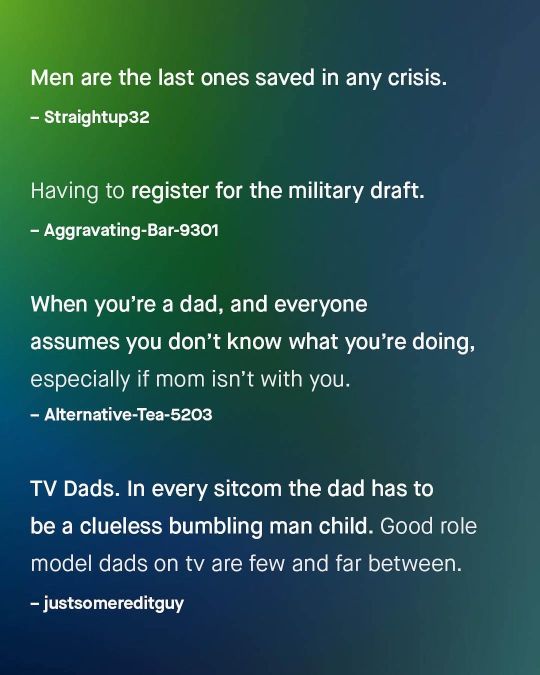

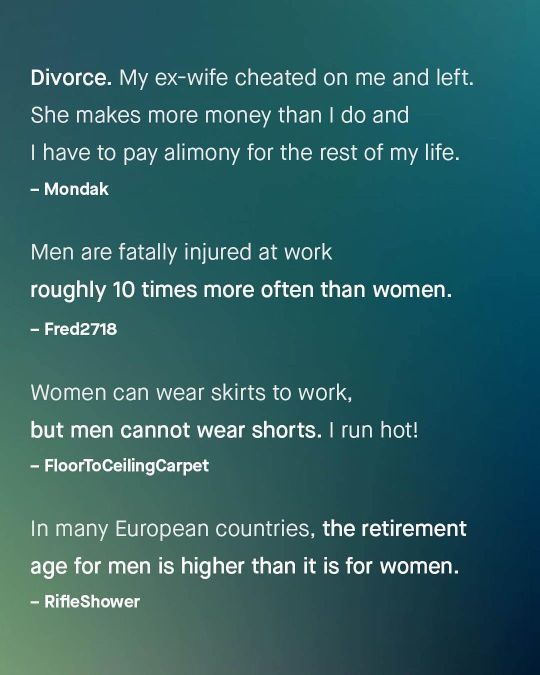
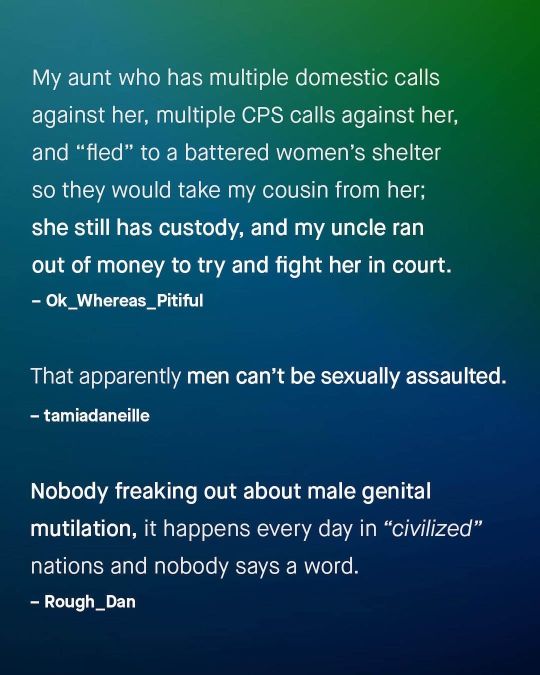
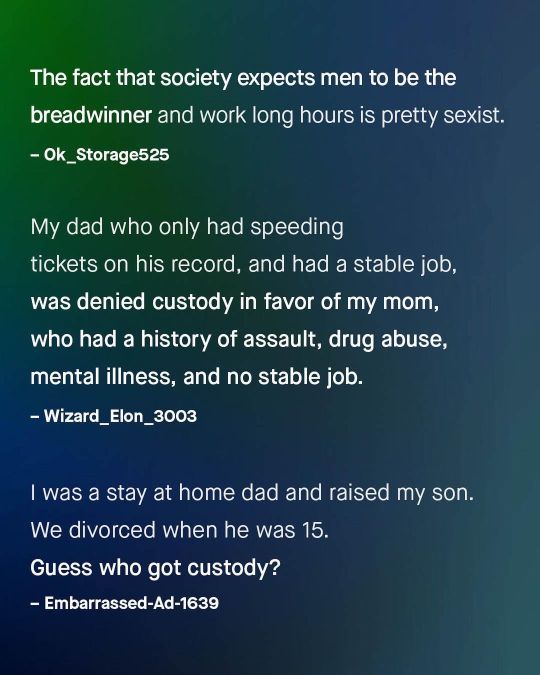
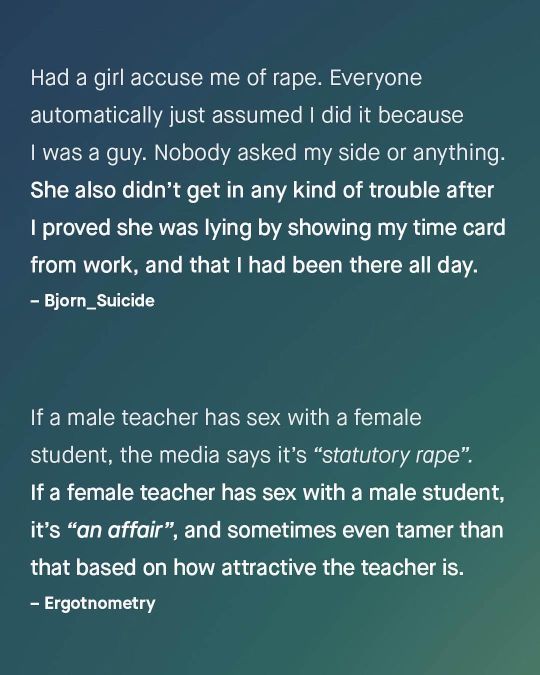


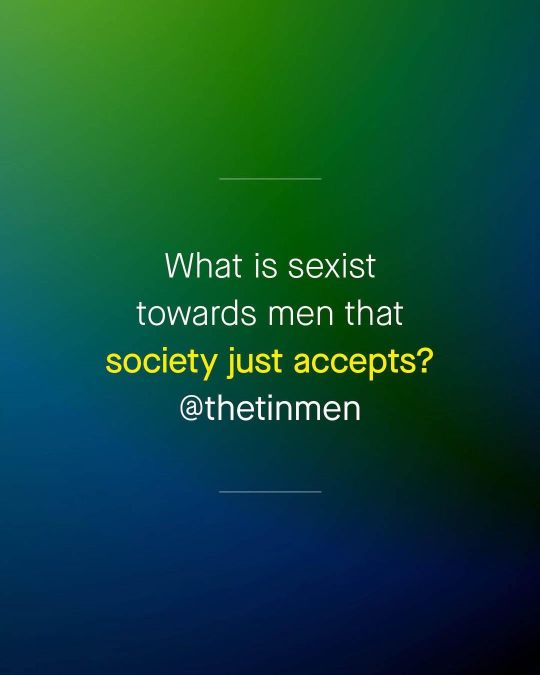
‘Men can’t experience sexism’, is both wrong and, ironically, sexist toward men.
Sexism is not a one way street, but our narrow perspectives and exclusionary conversations around it often are.
Sexism against men, as it is for women, is not just interpersonal - it is structural, legal, and systemic.
It’s more than men not being able to wear a dress, or an inability to cry; it is society seeing men as inherent predators, as non-victims, as second class parents, as pigs and deadbeats, undeserving of compassion or support.
It is to leave men out in the cold, and to strip fathers of their rights.
It is to laugh in the face of those hurting; to scoff at their pain, or bury our heads deep in the sand when they ask for help.
It is to name everything bad in the world after them; to call them “toxic” or “fragile”, and to deny the misandry that plagues their existence.
Sexism against men is real, as it is against women.
The difference is clear: the gatekeepers and arbiters of the conversation of ‘sexism’ have become enamoured with their own dogmatic nonsense, with their puritanical view of women, and the sound of their own voice.
Such people – society’s great guardians of morality – have fallen into the doldrums of their own ignorance, morphing into their own worst enemy.
So, let’s widen that perspective.
Let’s ask - what is something sexist toward men that society just ignores?
--
More here:
https://www.reddit.com/r/AskReddit/comments/xkzont/what_is_sexist_towards_men_that_society_just/
==
False accusations need to be treated as attempted homicide. Rapists, child molesters and child murderers are often abused and even killed in prison, as they occupy the bottom of the prison hierarchy. Which means someone who knowingly falsely accuses you with an intent to have you incarcerated is overtly attempting to kill you by proxy.
Nobody can change their height. But anyone can change their weight. If it's okay to decline interest in someone because of their height, which is immutable, it's even more reasonable to decline interest in someone because of their weight, which is mutable.
#The Tin Men#false accusations#false rape accusations#misandry#divorce#child custody#shared parenting#fatherhood#religion is a mental illness
14 notes
·
View notes
Text
last thought of the day: i don't think the way she went about it was helpful, but based off of what atom was telling her, i am on chueams side that she should cut off her friendship with boston.
and that's not because she already assumed some things about him, but even when you are the bestest of friends and cannot imagine your friend doing something like that, it is the correct thing for her to believe atom in this situation
#only friends the series#only friends spoilers#spoilers#obviously this is devastating for boston but a friendship break-up because you got falsely accused of rape is somewhat more salvagable than#not believing your younger brother#doesn't mean boston will or should accept any future apology and this this isn't a massive hit for him#also why i am glad nick is with him atm even when that's putting a lot on my already distraught boi#the fallout of this will be interesting
11 notes
·
View notes
Text
youtube
Trevor Bauer Accuser GETS BLASTED For Making Up Incident Allegedly
1 note
·
View note
Note
Real victims already have a hard enough time getting their rapists convicted without people like you screaming about the 2% of cases that make up false accusations. If you're genuinely saying that you're willing, and require, someone to rape another person in order to be proven as a rapist, you're actively contributing to the culture that makes it so difficult for rape and sexual assault to be taken seriously in court.
https://pubmed.ncbi.nlm.nih.gov/21164210/
https://www.brown.edu/campus-life/health/services/promotion/sexual-assault-dating-violence/myths-about-sexual-assault-reports
Between 2% and 10% of sexually topical allegations are dismissed as or rescinded as false allegations per annum in the USA.
In 2022, excluding unforced statutory rape and lesser degree sex offences, there were 133,294* reported forced rape cases in the USA.
(*https://www.statista.com/statistics/191137/reported-forcible-rape-cases-in-the-usa-since-1990/)
That means (on potential statistical value) there were between 2,666 and 13,330 false allegations. Again, working on pure statistics here.
And not to mention the amount of victims who rescind their truthful allegations because of threats, fear, ect.
That means there were between 130,628 and 119,946 valid rape reports. Just reports, mind you. I can assure you, that does not equal the reflected value in actual convictions.
Are you seriously telling me that you're willing to allow 130,628 potential rapists to walk free on the off-chance that 2,666 of them are innocent? That you're willing to allow untold numbers of people to be raped, when it could've been prevented, just because, maybe, that one victim isn't telling the truth?
....
So you're saying we should just accept innocents lives being ruined and taken because you've convinced yourself only 2% of cases is false?
And worse, you're saying you DON'T need someone to rape someone in order to believe they fucking raped someone??? "If you're willing, and require, someone to rape another person in order to be proven a rapist"? The fuck are you talking about??? If there's no fucking proof, they can't be convicted, nor should anyone believe they raped. If they rape another person and there's proof, then they will be convicted.
Why is it such a difficult concept to grasp that we shouldn't keep encouraging a culture that ruins innocent lives as long as they have a penis and woman cries "rape"? That "just believe women" and being willing to sacrifice innocent men just so women will be believed no matter what, which leads to more and more accusations of rape being proven false, is both INCREDIBLY sexist and straight up fucking EVIL.
I hate to say it, but I'm convinced at this point you only hold this stance because you're a woman, and thus not one of the people who's lives will be fucking ruined by someone claiming you raped them. Why else view sacrificing innocent people as at all fair, just, or needed?
9 notes
·
View notes
